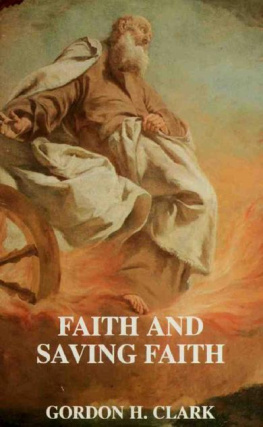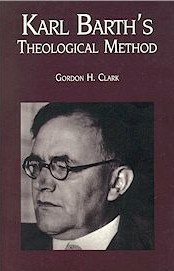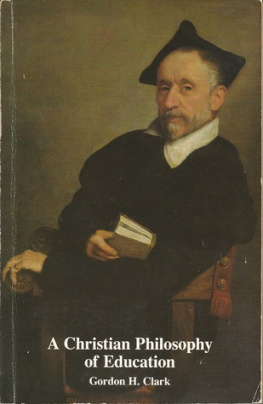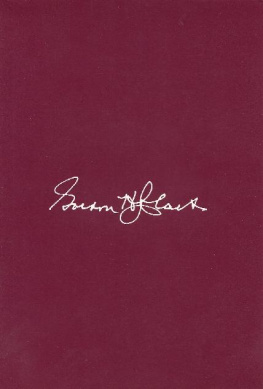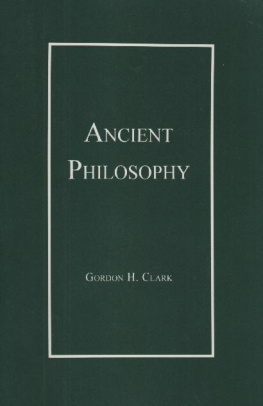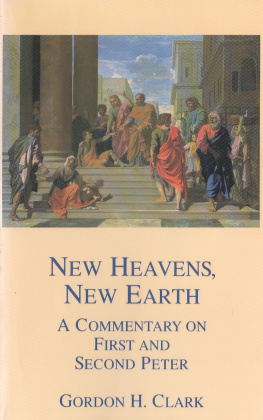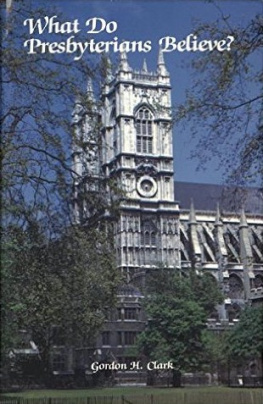Gordon H. Clark - First John
Here you can read online Gordon H. Clark - First John full text of the book (entire story) in english for free. Download pdf and epub, get meaning, cover and reviews about this ebook. year: 1992, publisher: Trinity Foundation, genre: Religion. Description of the work, (preface) as well as reviews are available. Best literature library LitArk.com created for fans of good reading and offers a wide selection of genres:
Romance novel
Science fiction
Adventure
Detective
Science
History
Home and family
Prose
Art
Politics
Computer
Non-fiction
Religion
Business
Children
Humor
Choose a favorite category and find really read worthwhile books. Enjoy immersion in the world of imagination, feel the emotions of the characters or learn something new for yourself, make an fascinating discovery.
- Book:First John
- Author:
- Publisher:Trinity Foundation
- Genre:
- Year:1992
- Rating:3 / 5
- Favourites:Add to favourites
- Your mark:
- 60
- 1
- 2
- 3
- 4
- 5
First John: summary, description and annotation
We offer to read an annotation, description, summary or preface (depends on what the author of the book "First John" wrote himself). If you haven't found the necessary information about the book — write in the comments, we will try to find it.
First John — read online for free the complete book (whole text) full work
Below is the text of the book, divided by pages. System saving the place of the last page read, allows you to conveniently read the book "First John" online for free, without having to search again every time where you left off. Put a bookmark, and you can go to the page where you finished reading at any time.
Font size:
Interval:
Bookmark:
GORDON H. CLARK
THE TRINITY FOUNDATION JEFFERSON, MARYLAND
Cover: Elijah Fed by the Raven Giovanni Girolamo Savoldo National Gallery of Art, Washington Samuel H. Kress Collection
Copyright 1980 by The Trinity Foundation Second edition copyright 1992 by The Trinity Foundation Post Office Box 700 Jefferson, Maryland 21755
ISBN: 0-940931-94-X
Books by Gordon H. Clark
Readings in Ethics (1931)
Selections from Hellenistic Philosophy (1940)
A History of Philosophy (coauthor, 1941)
A Christian Philosophy of Education (1946, 1988)
A Christian View of Men and Things (1952, 1991)
What Presbyterians Believe (1956)1 Thales to Dewey (1957, 1989)
Dewey (1960)
Religion, Reason and Revelation (1961, 1986)
William James (1963)
Karl Barths Theological Method (1963)
The Philosophy of Science and Belief in God (1964, 1987) What Do Presbyterians Believe? (1965, 1985)
Peter Speaks Today (1967)
The Philosophy of Gordon H. Clark (1968)
Biblical Predestination (1969) Historiography: Secular and Religious (1971)
II Peter (1972)
The Johannine Logos (1972, 1989)
Three Types of Religious Philosophy (1973, 1989)
First Corinthians (1975, 1991)
Colossians (1979, 1989)
Predestination in the Old Testament (1979) I and II Peter (1980)
Language and Theology (1980)
First John (1980, 1992)
Gods Hammer: The Bible and Its Critics (1982, 1987) Behaviorism and Christianity (1982)
Faith and Saving Faith (1983, 1990)
In Defense of Theology (1984)
The Pastoral Epistles (1984)
The Biblical Doctrine of Man (1984, 1992)
The Trinity (1985, 1990)
Logic (1985, 1988)
Ephesians (1985)
Clark Speaks From the Grave (1986)
Logical Criticisms of Textual Criticism (1986, 1990)
First and Second Thessalonians (1986)
Predestination ( 1987)
The Atonement (1987)
The Incarnation (1988)
Todays Evangelism: Counterfeit or Genuine? (1990) Essays on Ethics and Politics (1992)
Sanctification (1992)
The major themes of Johns first letter are truth and love. Perhaps no other New Testament author spends as much time discussing those ideas as John does in his Gospel, Revelation, and three letters. The word love appears over one hundred times in Johns five works; the words true and truth appear about 85 times. John obviously thought the two ideas were very important. He also thought they were closely connected. God is both truth and love. God is truth himself, and God acts in love: In this is love, not that we loved God, but that he loved us and sent his Son to be the propitiation for our sins. Christians are to believe the truth and act in love. If one acts according to the truth, one is acting in love.
Modern churches disagree with both Johns emphasis and his demonstration of the connection between truth and love. They think that truth has little or nothing to do with love; in fact, truth may actually be opposed to love. Modern thinking says: Love is a matter of the heart; truth is a matter of the head. Truth leads to arrogance and pride; love leads to service and humility. Truth is cold and intellectual; love is warm and spiritual.
One finds none of this sort of thinking in John. For example, John addresses his second letter to the chosen lady and her children, whom I love in truth; and not only I, but also all who know the truth, for the sake of the truth which abides in us and will be with us forever. He ends his benediction in verse 3 with the words, in truth and love. John continues to emphasize the close connection between love and truth in verses 9 and 10: Anyone who goes too far and does not abide in the teaching of Christ, does not have God; the one who abides in the teaching has both the Father and the Son. If any one come to you and does not bring this teaching, do not receive him into your house, and do not give him a greeting... John commands that no hospitality be shown to any teacher who does not teach the truthno hospitality, not even a greeting. That is love. John explains why: for the one who gives him a greeting participates in his evil deeds.
Modern thinking says Johns command is unloving. But that merely means that the modern thinkers not only misunderstand what John means by truth , but also what he means by love. Indiscriminate, perhaps promiscuous would be an even better word, affection seems to be the modern meaning of love, but Christian love is something quite different. John says clearly what he means by love: For this is the love of God, that we keep his commandments. And this is love, that we walk according to his commandments. One can agree with the modern thinkers or one can agree with John; one can be either an unbeliever or one can be a Christian. What one cannot do, for it would be neither truthful nor loving, is to claim to be a Christian and to disagree with John.
In his commentary, Gordon Clark deals with Johns themes of love and truth in great detail. This book is a verse-byverse commen-tary on Johns letter, and the detailed study will richly reward the attentive reader. John wrote his letter so that we might not sin. Let us study it thoroughly, believe the truth, and act in love.
John W. Robbins March 1992
2:1 My children, I am writing these things to you that you may not sin. And even if someone sins, we have an advocate with the Father, Jesus Christ, [the] just [one].
TO whom did John write? Pauls Epistles are addressed to churches at Rome, Corinth, Thessalonica, and so on, or to individuals, Titus and Timothy. But Johns letter is addressed to nobody. Paul signed his letters. So did Jude, James, and Peter. But here no proper name appears except that of Jesus Christ. The letter may have been sent to the seven churches of Asia Minor, or to one or two of them. It is plausible to assume that his immediate addressees were mainly his own converts because of the phrase my children. We cannot suppose that John founded these churches. Paul preceded him in Ephesus. But sometime after the destruction of Jerusalem John came to Ephesus and remained in the vicinity until his death in about A.D. 100. The tone of the Epistle is that of a well-known, loving, and beloved father. This makes it unlikely that the Epistle was written before, say, the year 80. But though there is no certainty as to his immediate addressees, that is to which or how many congregations he sent the letter, we know that the Holy Spirit addressed the letter to all Christians in every land and every age.
It is possible also to infer that since the Christians of Johns day were his children, a contemporary minister is the father of his congre-gation. Protestants do not much care for the Roman Catholic usage of Father; and the short length of pastorates, which in recent years has degraded the pastor into an administrator, or into a semiprofessional counselor, is not conducive to fatherly responsibilities. But Paul, as well as John, was a father, Johns purpose in addressing Christians was to encourage them not to sin. The Jews in the time of Paul attacked the doctrine of justifica-tion by faith alone on the ground that it encouraged sinning. To this objection Paul wrote Romans 6-8. Here also, but more briefly, John strongly discourages sinning. There is no logical incompatibility between justification and sanctification. But though the logic is so clear, and the apostles replies so ancient, the same objections recur today in befuddled minds. The Epistle is pertinent today.
Minds are befuddled by sin. Adam before the fall may have been ignorant of many things, but his original righteousness guaranteed him against any blunder in logic. Sin then disturbed his mind. So today people may argue: sinless perfection is impossible, therefore it is useless and foolish to try to achieve it, therefore I shall be content to sin every now and then. This is a plausible argument. But a flaw may be found in it. Indeed, sinless perfection in this life is an unattainable goal. But progress toward that goal is not impossible. The goal defines the direction. Suppose a student wants to become a great mathematician. He not only wants to prove the Fermat theorem, but to go far beyond it. Yet presumably he realizes that he cannot exhaust the future possibilities of mathematics. Does he then conclude that he will be satisfied with a blunder now and then? He knows very well that he will make blunders; but he never ceases trying to avoid them.
Font size:
Interval:
Bookmark:
Similar books «First John»
Look at similar books to First John. We have selected literature similar in name and meaning in the hope of providing readers with more options to find new, interesting, not yet read works.
Discussion, reviews of the book First John and just readers' own opinions. Leave your comments, write what you think about the work, its meaning or the main characters. Specify what exactly you liked and what you didn't like, and why you think so.


